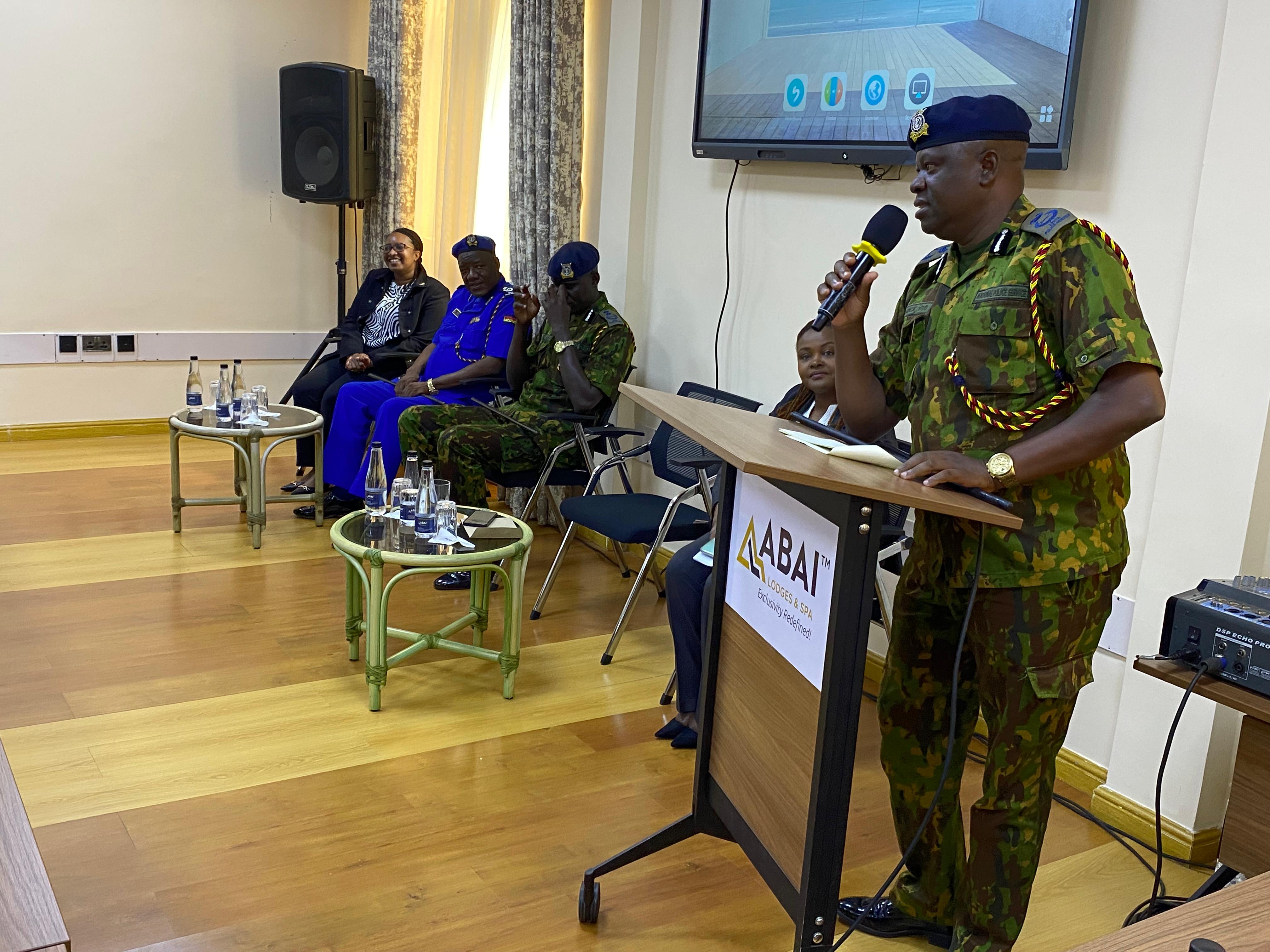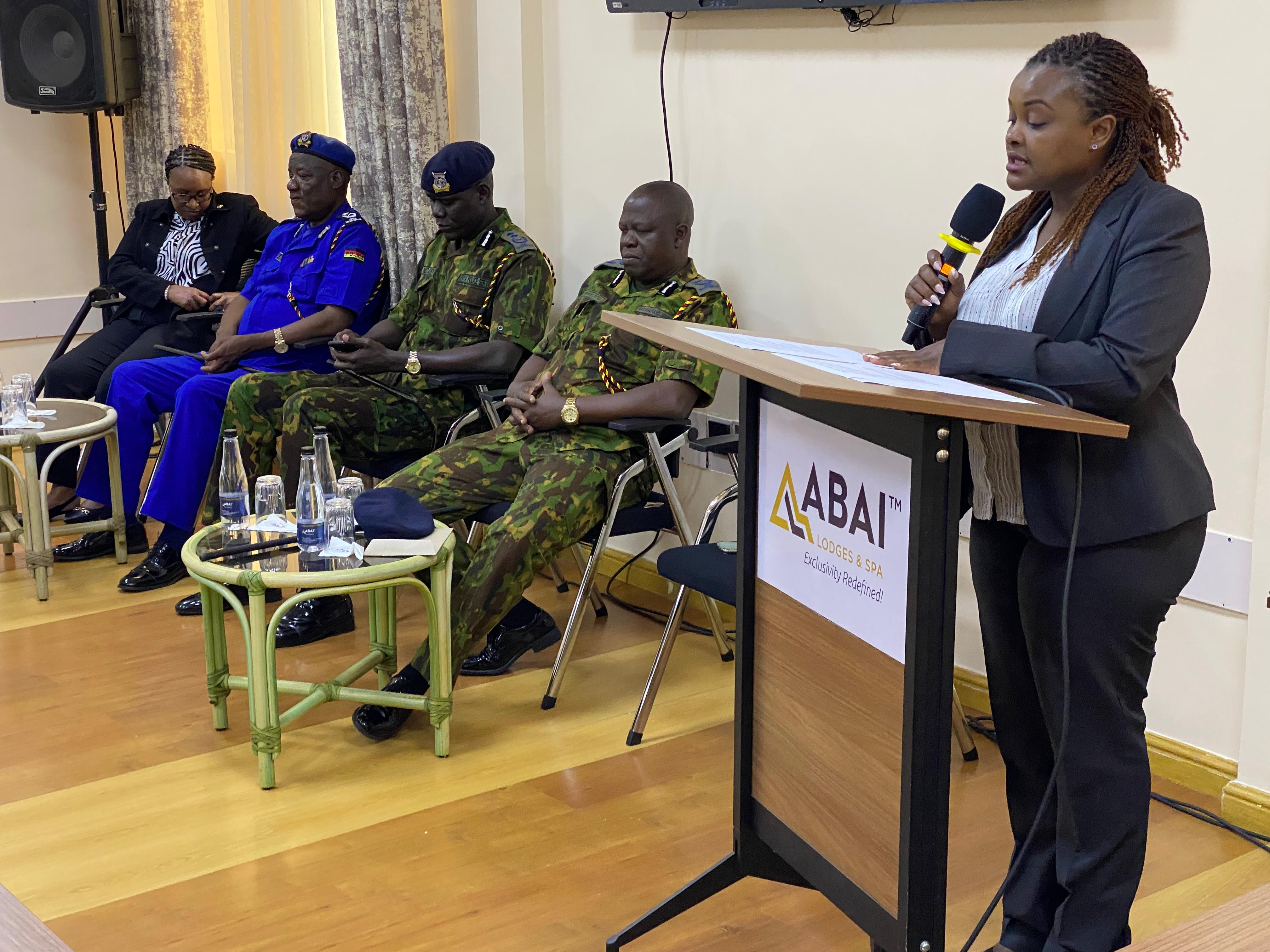
 Senior assistant Inspector General and principal assistant to the Deputy Inspector General Patrick Tito during a training session in Kirinyaga on September 2, 2025
Senior assistant Inspector General and principal assistant to the Deputy Inspector General Patrick Tito during a training session in Kirinyaga on September 2, 2025The National Police Service has partnered with International Justice Mission Kenya to train police officers on mental wellness and the provision of psychosocial support.
The four-day training that started on Tuesday will benefit 43 professional counsellors, psychologists and chaplains, who play a big role in providing support to police officers struggling with mental issues, together with their families.
Deputy Inspector General Eliud Langat, in a speech read by Senior Assistant Inspector General and Principal Assistant to the Deputy Inspector General, Patrick Tito, underscored the role played by police officers as the first line of defence for citizens.
He emphasised the need to ensure police officers remain mentally strong through the provision of proper psychosocial support systems and improved welfare as a way of enhancing their resilience.
Langat assured officers they would be fully supported through the empowerment of the Directorates of Counselling and Chaplaincy, which provide spiritual, emotional and psychosocial support to enhance their mental well-being to enable them navigate highly stressful and traumatic situations while on duty.
“This training programme is extremely welcome and will boost the general wellness of the officers, aligning with the 2023-27 National Police Service Strategic Plan,” he said, lauding the IJM Kenya for supporting it.
Numerous challenges faced by police officers, including improper welfare and working conditions coupled by working away from their families while facing normal life difficulties has seen a huge number of them suffer from mental challenges.
According to the Independent Policing Oversight Authority (Ipoa), NPS recorded 57 cases of officers taking their own lives between 2016 and 2020, while another 65 killed other people, mostly those closely related to them such as spouses, family members, colleagues and friends.
The high prevalence of loss of lives prompted the authority to conduct an analysis in 2021 called 'Murders and Suicides in the National Police Service: An analysis on Causes and Prevention Strategies', which confirmed that police officers committed 13 murders and 11 suicides annually.
The analysis report cited psychological stress leading to poor mental health, easy access to firearms, nature of police recruitment and training, discrimination and unfair treatment by supervisors, involvement in misconducts and officers stigma against mental illnesses as some of the contributing factors.
It further recommended psychological tests during the recruitment process, regular review of the Police Training Curriculum, training on trauma resilience, improved welfare, controlled issuance of firearms, facilitation of mental health sensitisation forums and better communication between senior and junior officers.
It also called of
the full implementation of NPS Psychological Counselling Policy 2018, which requires the provision of counsellors and psychologists at all levels of police
establishments.
 Esther Njuguna, a senior manager at IJM Kenya, addressing counsellors, psychologists and chaplains under the National Police Service in Kirinyaga
Esther Njuguna, a senior manager at IJM Kenya, addressing counsellors, psychologists and chaplains under the National Police Service in KirinyagaIJM Kenya country director Vincent Chahale said the officers will also be trained on trauma-informed care to ensure trauma survivors are adequately supported and not re-stigmatised.
In a speech read by Esther Njuguna, senior manager of Survivor Services at IJM Kenya, Chahale underscored the need for accountability in NPS to promote public confidence and trust in the criminal justice system.
“We believe that if our criminal justice system holds
perpetrators accountable, they will be deterred from committing the offence and
people will feel protected,” he said.
Chahale, however, appreciated the immense responsibility shouldered
by police officers in protecting lives and property and maintaining order,
during which they often encounter traumatic experiences firsthand.
“This training and retreat is a continuation of our joint
efforts to ensure that in caring for others, you too receive the care and
support you deserve,” he added, pledging to continue supporting NPS on the journey
of providing counselling services.
Between 2021 and
2024, the National Police Service Commission (NPSC) handled more than 64,000 of
counselling and psychosocial support with at least 12,000 police officers
suffering from work related mental health issues.
The training
comes against the backdrop of excessive use of force recorded during protests
that have erupted in the country since June last year.
Missing Voices, a
coalition of civil society organisations that campaign against enforced
disappearances and extrajudicial killings, reported 104 cases of police-related
killings and 55 cases of enforced disappearances last year.
In July this
year, Interior CS Kipchumba Murkomen issued a policy directive
requiring police officers to only use force and firearms in accordance to the
law and to the extent required for the performance of their duties.
“Force must never
be used as a form of extrajudicial punishment. The use of force shall be no
more than the minimum reasonably necessary in the circumstances,” he said.
“Police officers
shall not use force except in self-defence or defence of others against
imminent threat of death or serious injury.”
It further required NPS to conduct regular
de-escalation training programmes to equip officers with the skills to
de-escalate diverse situations and make counselling available to officers
involved in situations where force and firearms are used.
The policy
directive followed a meeting held between the CS and IJM Kenya officials in
which they discussed the integration of trauma informed
care within the National Police Service training curriculum, community
policing and capacity building efforts.
IJM Kenya emphasised the need for the government to
operationalise key legislative frameworks, such as the Coroners Act, which was
enacted in 2017 but has yet to be implemented.
The Act establishes a legal framework for investigating reportable
deaths in suspicious, violent, or unexplained circumstances and provides for
the creation of the National Coroners Service.
Instant Analysis
The training comes against the backdrop of excessive use of force recorded during protests that have erupted in the country since June last year. Numerous challenges faced by police officers, including improper welfare and working conditions coupled by working away from their families while facing normal life difficulties has seen a huge number of them suffer from mental challenges. According to Independent Policing Oversight Authority, NPS recorded 57 cases of officers who died by suicide between 2016 and 2020 while another 65 killed other people, mostly those closely related to them such as spouses, family members, colleagues and friends.

![[PHOTOS] China holds massive parade to mark 80th anniversary of WWII](/_next/image?url=https%3A%2F%2Fcdn.radioafrica.digital%2Fimage%2F2025%2F09%2Fbd5dfa7a-3a06-486e-b6b0-6b032c0ffc73.jpg&w=3840&q=100)





![[PHOTOS] Gachagua hosts content creators](/_next/image?url=https%3A%2F%2Fcdn.radioafrica.digital%2Fimage%2F2025%2F09%2F19d2ed2b-74df-43e2-a66d-1c24637466c4.jpg&w=3840&q=100)



